The Seagate BarraCuda (500GB) SSD Review: Getting Back In The Game
by Billy Tallis on December 7, 2018 8:00 AM ESTAnandTech Storage Bench - Light
Our Light storage test has relatively more sequential accesses and lower queue depths than The Destroyer or the Heavy test, and it's by far the shortest test overall. It's based largely on applications that aren't highly dependent on storage performance, so this is a test more of application launch times and file load times. This test can be seen as the sum of all the little delays in daily usage, but with the idle times trimmed to 25ms it takes less than half an hour to run. Details of the Light test can be found here. As with the ATSB Heavy test, this test is run with the drive both freshly erased and empty, and after filling the drive with sequential writes.
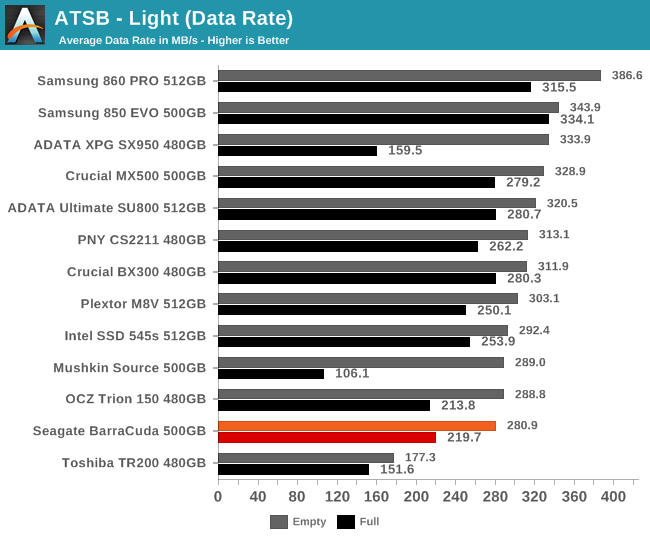
The Seagate Barracuda's average data rate on the Light test is the slowest among mainstream SATA drives, at about 15-20% slower overall than the best SATA drives with TLC NAND.
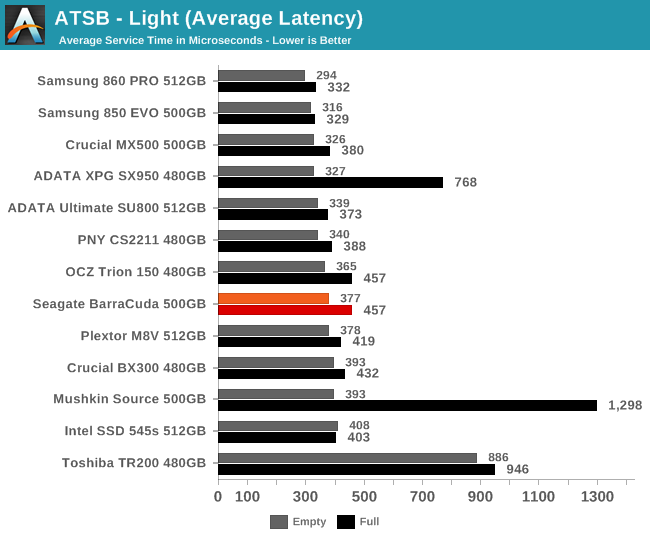
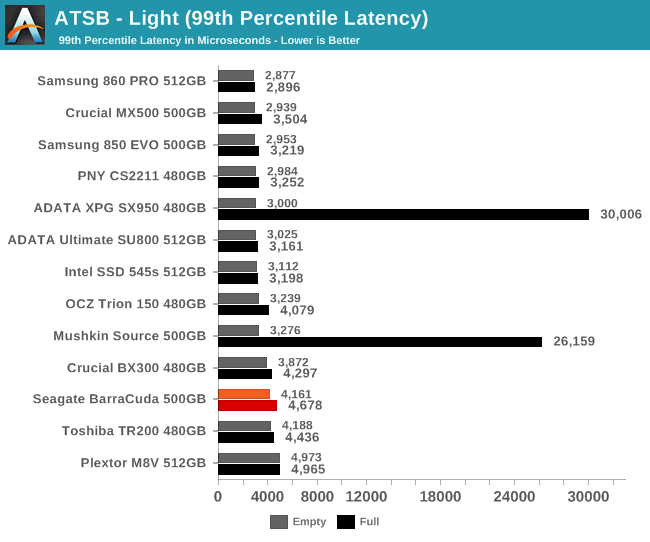
The average latency from the BarraCuda during the Light test is higher than some of the best mainstream drives like the Crucial MX500, but not high enough to be a concern. The 99th percentile latency scores are worse by than most of the competition by at least 1ms, which suggests that the BarraCuda might have some very mild stuttering, but nothing like what the Mushkin Source or ADATA SX950 exhibit when full.
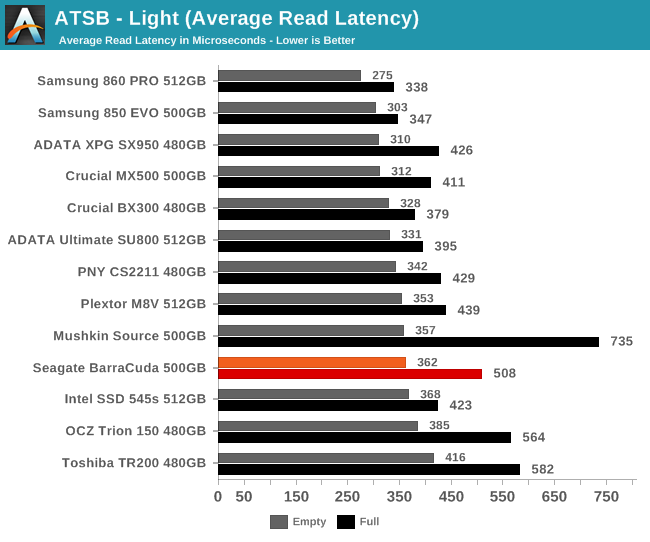
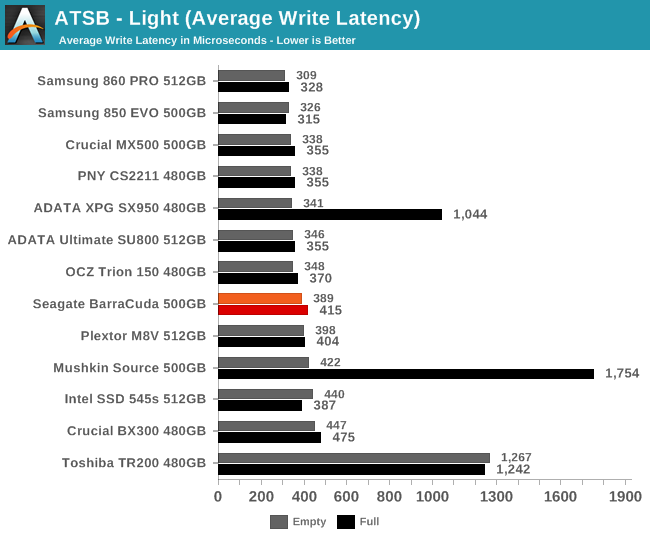
The average read and write latencies from the BarraCuda aren't top notch but still mostly fall within the normal range for mainstream SATA drives. The read latency takes a fairly large hit when the test is run on a full drive, leaving it slower than any recent mainstream drive, but still faster than the two DRAMless SSDs.
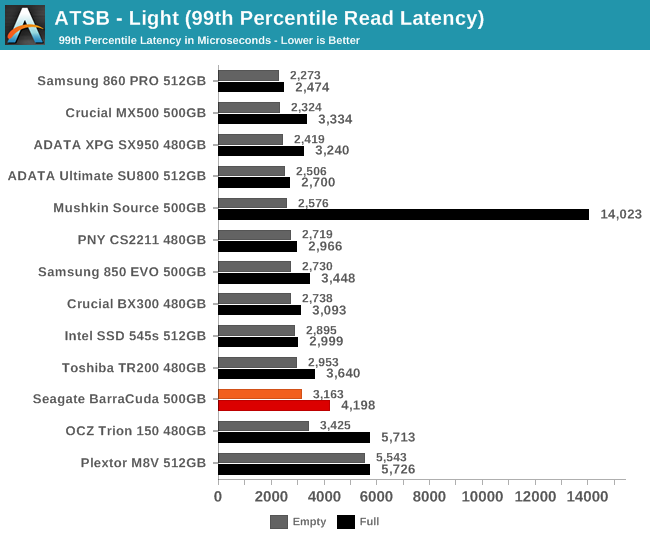
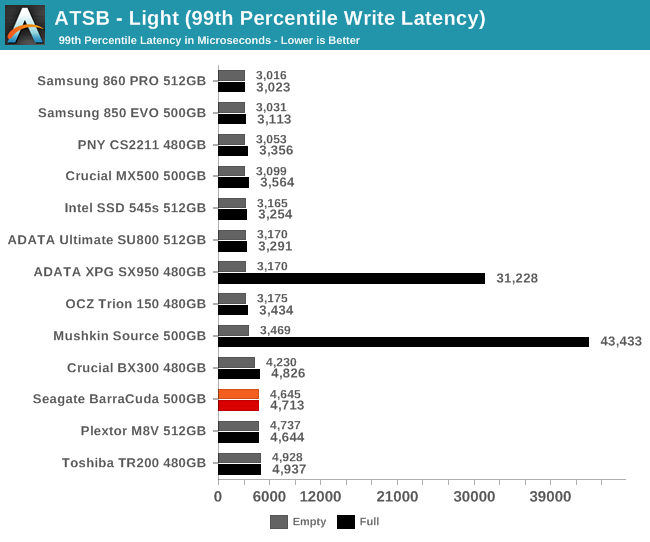
The 99th percentile read and write latency scores for the BarraCuda both show that the BarraCuda is slightly slower than its competition, but not by enough to be a serious problem.
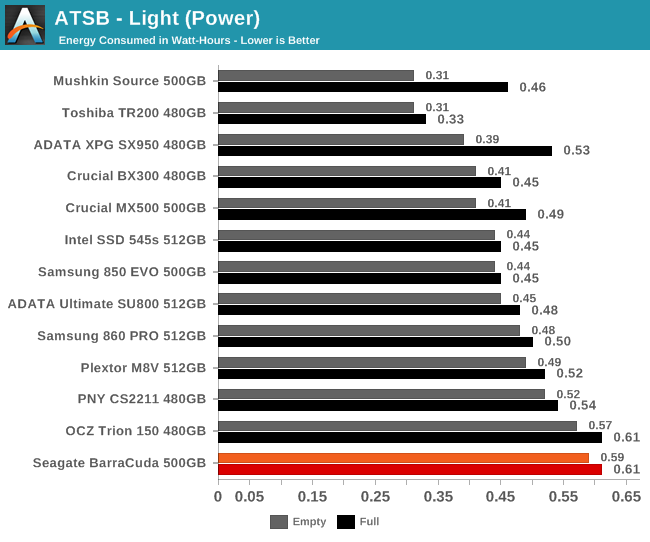
The Seagate BarraCuda is the least energy-efficient drive in this bunch, due in part to its low performance, but high power consumption under load is the bigger factor on this test.










39 Comments
View All Comments
takeshi7 - Friday, December 7, 2018 - link
"they bought controller designer SandForce right around when SandForce drives disappeared from the market for good."That's not strictly true. Seagate still use controllers based on SandForce for some of their enterprise SSDs. Look for DuraWrite Technology in their marketing materials to know which ones.
The_Assimilator - Friday, December 7, 2018 - link
SandForce disappeared from the *consumer* market, to be precise. And it was all the more surprising because of how much they shaped the formative years of mainstream SSDs. Reading about the reasons behind that company's implosion in someone's autobiography is going to be interesting.mikato - Friday, December 7, 2018 - link
I would like to know this also. Did the top brains get hired away to somewhere else somehow right when Seagate bought them or what?DanNeely - Friday, December 7, 2018 - link
IIRC Rumor mill at the time was that their next gen controller wasn't competitive and unable to get the design wins they needed they ran out of money and got snapped up on the cheap.Qasar - Friday, December 7, 2018 - link
https://en.wikipedia.org/wiki/SandForceBeaver M. - Wednesday, December 12, 2018 - link
Nothing was surprising. Every expert knew they wouldnt last long with their focus on compressed performance and manufacturers promoting that without criticism.Many customers felt scammed when the controllers never delivered the performance they promised, because the real high numbers were only achievable with compressible content (who the hell has a 5 GB doc file?).
In every forum experts told people not to buy Sandforce SSDs or memory sticks, because of that fact. That sealed their fate.
HighTech4US - Friday, December 7, 2018 - link
Not competitive on price.$84.99 for the 500GB model.
I just purchased on Dec 4th a brand new Intel 545s 2.5" 512GB SATA III 64-Layer 3D NAND Internal Solid State Drive SSD from Newegg for $34.99 (after $20 PayPal coupon)
Death666Angel - Friday, December 7, 2018 - link
"after $20 PayPal coupon" So, Christmas offerings plus another coupon? Great comparison!HighTech4US - Monday, December 10, 2018 - link
So show me where I can get the this 500GB model for $54..99 then. That was what I paid pre-coupon for the 512GB Intel SSD.Like I said Seagate is not competitive on price.
Donkey2008 - Thursday, December 13, 2018 - link
I used a $50 Amazon gift certificate to get my Samsung SSD for $4.99. Seagate will never beat that price.(sarcasm)